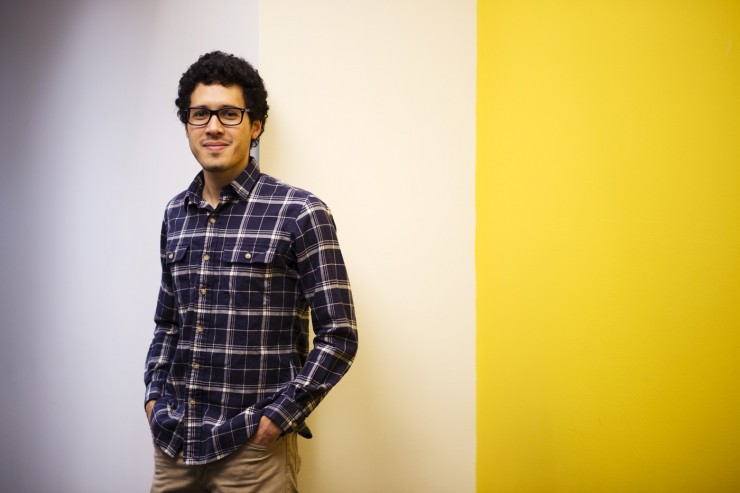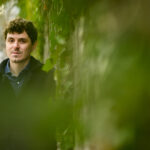Departments In This Story
The power of digital journalism
By Greg St. Martin, Posted in news@Northeastern, February 25
Jorge Caraballo Cordovez is optimistic, eager, and motivated. He says his native Colombia has reached a turning point after years of armed conflict, that now there is a critical need to help communities back home “reconstruct the social cohesiveness that decades of violence has torn apart.”
And he wants to be part of the solution, harnessing his academic acumen to help put the pieces back together. As Caraballo, a graduate student in the School of Journalism, puts it: “I’m convinced that journalism and digital technologies can play an essential role in this process.”
Caraballo, 27, received a bachelor’s degree in journalism from the University of Antioquia in Medellín, Colombia. In 2014 he earned a Fulbright scholarship to pursue a master’s degree in the United States, and Northeastern’s Media Innovation program, he says, stood out because of the opportunity to acquire the digital storytelling skills that journalists need to succeed in the 21st century.
Now, an exciting new opportunity
Caraballo, MA’17, recently received a Google News Lab Fellowship to work this summer at Matter, a San Francisco- based accelerator for media startups, where he’ll develop new content for its website and social media. He is one of only eight 2016 fellows out of an applicant pool of more than 1,800 to be selected for the 10- week fellowship, which begins in mid- June and runs through August.
Google News Lab partners with several news organizations to offer the fellowships, and Caraballo applied specifically to Matter. He says Matter’s mission to help media entrepreneurs build “a more informed, connected, and empowered society” aligns with his goals as a scholar and a storyteller. He’s also keen on soaking up a wealth of knowledge from the culture of media entrepreneurship in which he’ll be immersed.
Matter invests seed funding and offers a 20- week program for startups that includes a kickoff boot camp, weekly speakers, and monthly reviews, and wraps up with a demo day. During the interview process, Matter challenged Caraballo to identify a project he would want to pursue there, one that would also fill a need for the company and increase its impact. He suggested creating more online content to help entrepreneurs understand the Matter experience and train them on what they need to know before they apply. This content, which he aptly titled “Resources that Matter,” would include a series of podcasts about Matter’s mission.
“The freedom to acquire knowledge—that’s the beauty of journalism.”
— Jorge Caraballo Cordovez
Building a new skill set
While he’s only in his second semester, Caraballo says his Northeastern experience has already prepared him well for this fellowship. Through the Media Innovation program, he’s completed a course in interactive design—in which he learned how to develop a project using design thinking and code basic Web applications—and now he’s taking a course in interactive documentaries. Caraballo is also a writer for Storybench, an under- the- hood look at how digital storytelling is produced.
“He’s one of the most forward thinking students to come through,” says Aleszu Bajak, who has seen Caraballo’s work firsthand as the editor of Storybench and from teaching the Media Innovation Studio. He described Caraballo as a great observer and listener, and someone who brings an entrepreneurial spirit to problem solving and who is omnivorous with his diet of digital media skills.

Photo by Adam Glanzman/ Northeastern University
In September, Caraballo wrote a piece for Storybench assessing The New York Times’ coverage of the refugee crisis in Europe. Not only was he intrigued by the paper’s interactive storytelling, but the subject matter also hit close to home. More than 5.8 million Colombians had been internally displaced by conflict or violence as of December 2014, according to the Office of the United Nations High Commissioner for Refugees.
“This topic was very compelling to me, and I was interested in how The New York Times’ was telling that story and the tools and strategies it used,” says Caraballo, who adds that in Colombia he has volunteered to help coordinate cultural workshops for children in a settlement of internally displaced people in Medellín.
Caraballo says his undergraduate journalism experience provided a solid foundation in traditional journalism—print, radio, and TV—and, in fact, his final project, a series of profiles of Colombian writers, won a 2014 Simon Bolivar Award, Colombia’s national prize in journalism. But he craved the opportunity to learn how journalists can use digital tools to create powerful stories and connect with a society that is more connected to its mobile devices than ever before.
He’s confident that his Northeastern education, combined with the Google News Lab Fellowship experience, will equip him with the digital storytelling tools and savvy to make an impact when he returns to Colombia after graduation, which is a condition of his Fulbright scholarship.
He aspires to create a digital media platform that informs, educates, and connects the country’s regions through cultural journalism.
“The freedom to acquire knowledge—that’s the beauty of journalism,” he says.





